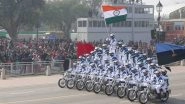New Delhi [India], Apr. 14 (ANI): The European Foundation for South Asian Studies (EFSAS) lent their voice to the ongoing Pashtun struggle in Pakistan, highlighting the struggles the people of the minority community face in the military-controlled nation.
According to their study, Manzoor Ahmad Pashteen, leader of the Pashtun Tahafuz Movement (PTM), has been demanding basic human rights for the Pashtun community in Pakistan and the release of disappeared individuals, allegedly abducted by the country's intelligence agencies.
Pashteen asserted on his belief in the rule of law and his demand included presenting the disappeared persons in court, which should be the only grounds to gauge their culpability for the alleged crimes.
Another one of the PTM's demands is the abolishment of the Front Crimes Regulations (FCR), a law which was enacted by the British Empire in an attempt to cease any rebellion by the Pashtuns. The FCR has been deemed by many as a 'legal tool' to violate human rights of the Pashtun community in Federal Administered Tribal Areas (FATA).
A former Chief Justice of the Supreme Court of Pakistan, while commenting on the FCR, said that it is "obnoxious to all recognized modern principles governing the dispensation of justice".
Former President of Pakistan, Asif Ali Zardari, amended the FCR in 2011, yet it has been castigated for its lack of effectiveness and implementation of the revised law.
The study also mentioned the apparent blackout by the Pakistan media during the rally held by Pashtun Youth in Peshawar on April 8, wherein Pashteen delivered an impassionate speech.
"This attitude of the Pakistani media has been a recurring phenomenon when Baloch, Sindhis and Kashmiris have made demands for justice and protested against exploitation of their resources. Often, such protests and demands are conveniently branded as 'Anti-national'and quickly claimed to be supported by 'foreign hands'," the study noted.
According to the study, international experts and analysts say that the reasons behind the inaction of the Pakistani media are closely linked with the military establishments. The media is intimidated with grave consequences it may face if it provides coverage to anything which puts the powerful Military rulers of Pakistan in a bad light.
"Attacks on journalists, like the one on Hamid Mir in 2014 because of extensive reporting on the Taliban, attributed to 'unidentified gunmen', but believed to have been carried out by intelligence agencies, further substantiate this notion," the study added.
Furthermore, in an attempt to bury incidents of human rights violations, the Army and other intelligence agencies often commit more human rights violations. It has been reported that the Police have filed criminal cases against Pashteen for criticizing the government and security agencies.
The Pashtun Tahafuz Movement or Pashtun Protection Movement was started mainly by young Pashtun activists who are demanding an end to what they say are human rights violations by authorities in the country's tribal regions.
They have been calling for the removal of military checkpoints in tribal areas and an end to "enforced disappearances" in which suspects are detained by security forces without due process. (ANI)
(The above story is verified and authored by ANI staff, ANI is South Asia's leading multimedia news agency with over 100 bureaus in India, South Asia and across the globe. ANI brings the latest news on Politics and Current Affairs in India & around the World, Sports, Health, Fitness, Entertainment, & News. The views appearing in the above post do not reflect the opinions of LatestLY)













 Quickly
Quickly


